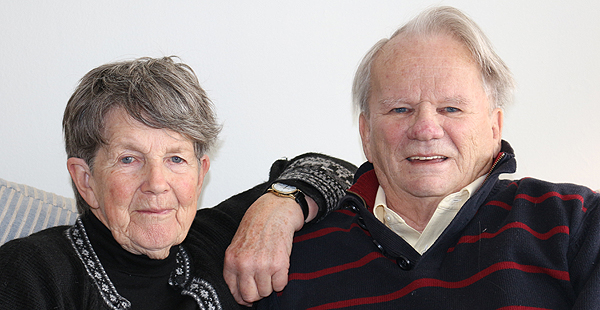
FIGHT OF HIS LIFE: Michael Jarvis, seen here with wife Sheila, is trying to get the provincial government to cover the cost of his medication.
A snow-white-haired Michael Jarvis hunkers down into the seat by his Summerhill apartment’s doorway. His breathing’s not quite laboured, but with a good ear you can tell he’s winded.
He smiles, but beneath the veil is a worried man.
Will the cost of his Esbriet, the current medication used to keep death from idiopathic pulmonary fibrosis at bay, require all the money he plans to leave to his widow?
It’s a concern the 80-year-old shares out of earshot of wife Sheila, 76, who’s in the kitchen preparing a meal for the couple.
Jarvis’ condition is a fatal disease that scars the lungs, thus inhibiting oxygen getting to the vital organs. He was diagnosed in 2008, and currently suffers from a mild-to-moderate stage of the illness. The term “idiopathic” means the cause is still unknown.
“I’ve been very lucky, because the median time for survival after diagnosis is 2.5 years,” he says, a hint of Scottish brogue in his voice. “And I’ve been going five (years).”
He and his wife have made sacrifices since his diagnosis. They sold their home in King Township a year ago to live in Toronto.
He’s given up tennis and golf, along with his greatest treasure, a CS27 sailboat.
“We explored all of the Great Lakes except for Lake Michigan,” he says, a grin as broad as a boon spanning his face. “I took the boat twice down to Newfoundland from here.”
He could go on, but Sheila comes out of the kitchen to steer him back on course.
Jarvis steadies, explaining Health Canada approved Esbriet in October 2012 for use in treating IPF patients. However, the provincial government refuses to fund the $48,000-a-year price tag.
Meanwhile, 27 European nations have approved the drug, 10 of which are funding the medicine, also known as perfenidone.
David Jensen, a spokesperson for the Ministry of Health and Long-Term Care and for minister Deb Matthews, said in an email to the Town Crier that the national review of Esbriet is complete and the Canadian Drug Expert Committee recommended that it not be funded since clinical trials were inconclusive.
“As a result, patient benefits are not clear, particularly with respect to the use of Esbriet and its impact on mortality or quality of life.”
There are no further plans since the Ontario Public Drug Programs’ executive officer, Diane McArthur, made the final decision in May 2013.
Jarvis is on borrowed time. His former employer, while he worked as a chartered accountant, has given him a lifetime drug coverage benefit, but it’s capped at $15,000. That offers him only three months’ worth of pills.
“(Matthews) has all of the information those other countries have, and she continues to say publicly they need more information,” he says, visibly frustrated. “It’s true it’s not a cure, but what it does is it’s said to extend your life for 10–15 years.”
That’s where Robert Davidson comes in. In 2009 he founded the Canadian Pulmonary Fibrosis Foundation in an effort to advocate for the reported 30,000 Canadian sufferers of IPF.
He suffered from the ailment until receiving a double-lung transplant in 2010.
He says he’s flummoxed by the Canadian Drug Expert Committee’s decision.
“The drug does work,” he said in a phone interview. “It does improve lung function and it has extended lives.
“It’s not a cure. It slows down the disease. But when you’re an IPF patient, anything that slows down the disease is really great. IPF is always fatal.”
The Trillium Drug Program does not accommodate Esbriet since it does not fall under the Ontario Drug Benefit program. The last option, the Exceptional Access Program, is an even tougher nut to crack, Davidson says.
“It’s easier to get approved for cancer drugs, because people understand cancer, know what cancer is about,” he says. “Most people don’t understand idiopathic pulmonary fibrosis.”
It’s a disease that has claimed the lives of some famous people, including actor Marlon Brando, singer Robert Goulet and stuntman Evel Knievel.
Still, raising awareness is a tough task for Davidson.
“If I can get a hold of more IPF patients who have this, then I can have more people helping each other in advocating for the government to approve this drug for funding,” Davidson says. “If we can get more people writing to minister Matthews, then they must take notice.
“This is the only drug out there that helps.”

